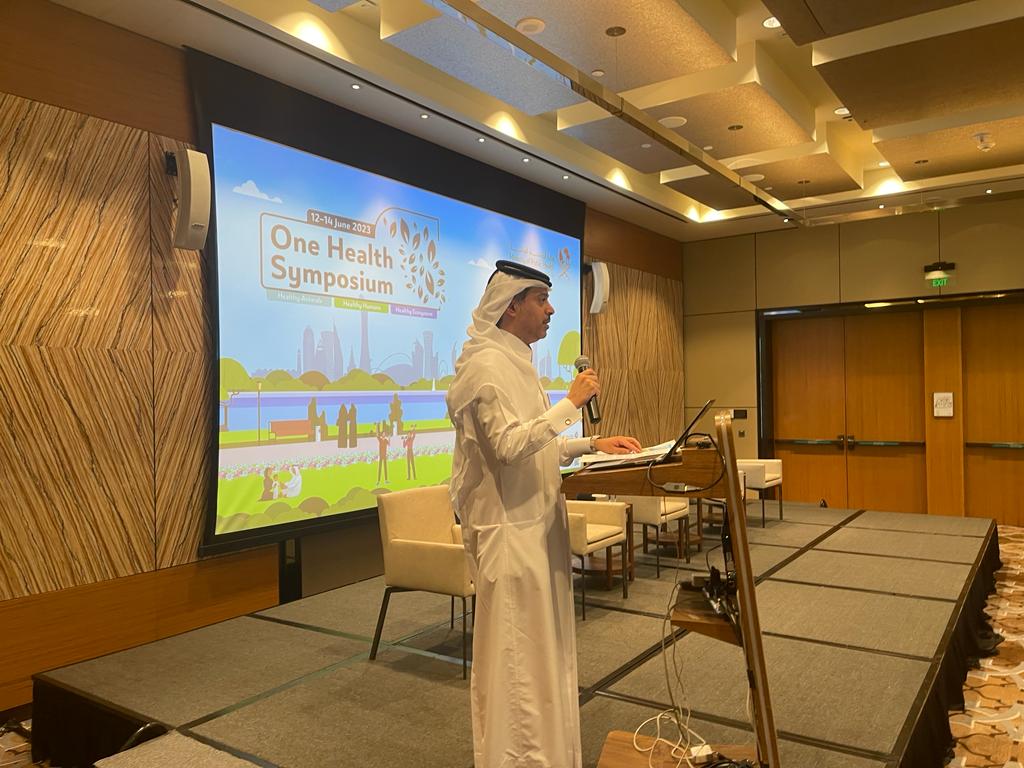Professional experts and academic researchers from the State of Qatar, participated in the symposium along with other GCC countries and international organizations to exchange their experiences and research results on One Health, and present results of recent research conducted in Qatar and a number of countries on zoonotic and emerging diseases.
The symposium, which was held under the auspices of the Qatar National Research Fund, covered a variety of significant topics, including, control of emerging and re-emerging zoonoses, control of endemic zoonoses, neglected tropical diseases and vector-borne diseases, enhancing food safety, reducing antimicrobial resistance, and progressively integrating the environment into the health agenda One.
Dr. Hamad Al-Rumaihi, Director of Health Protection and Communicable Disease Division at the Ministry of Public Health, welcomed all participants in his opening remarks. He added that since the Covid pandemic, utilizing the One Health approach has become urgently necessary, necessitating the formation of a multidisciplinary technical group to assess and investigate risks, conduct scientific research, and take appropriate measures that meet the needs of each sector. He also acknowledged Qatar Research Development and Innovation in Scientific Research for their support.
According to Dr. Mohamed Jarrar, Director of the Biomedical and Health Sciences Program, Qatar National Research Fund, such events are consistent with the Qatar’s approach to coordinate efforts to monitor and assess risks and develop appropriate measures to effectively address them. He expresses his confidence that the working group recommendations will be helpful in defining scientific research priorities in Qatar and that the One Health approach allows for multi-sector joint research.
The WHO's representative in Qatar, Dr. Rayana Bou Haka, stated that the organization would use its technical resources to support Qatar in their adoption of the One Health approach. Which is a unified approach that aims to achieve a sustainable balance and optimum health of humans, animals, plants, and ecosystems.
At the end of the symposium, representatives from the Ministry of Public Health reviewed the operational plan for the One Health approach and the next steps with decision-makers and partners, and a proposal for a roadmap for coordinated actions was presented.
Participated in the symposium representatives from The World Health Organization, the Food and Agriculture Organization of the United Nations (FAO), the United Nations Environment Programme, the World Organization for Animal Health, Global Health Development and the Eastern Mediterranean Public Health Network , the United Nations Development Fund, the Gulf and European Centers for Disease Control, Ministry of Municipality, Ministry of Environment and Climate Change, Hamad Medical Corporation, Primary Health Care Corporation, Qatar University, Anti-Doping Laboratory, Weill Cornell Medicine- Qatar, representatives of medical and veterinary laboratories and a number of private sector companies.
The COVID-19 pandemic served as a good example of how to handle and manage public health risks. As a result, the symposium provided an opportunity to learn from others' experiences and illustrate insightful lessons to achieve the goal of a better health, better care, and better value for the people of Qatar.

























